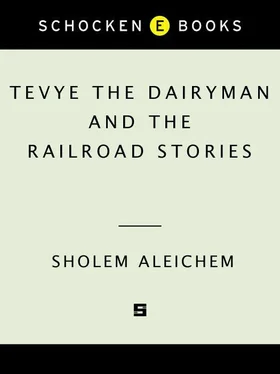For instance, all the talk you hear about doctors, indigestion, sanatoriums, toothaches, nervous conditions, Karlsbad, and so forth — you’d think it was all just a lot of malarkey, wouldn’t you? Well, let me tell you a story about that. Once I was traveling with a group of Jews. We were talking about doctors and prescriptions. At the time, it shouldn’t happen to you, I was having problems with my stomach, and a fellow passenger, a Jew from Kamenetz, recommended a medicine that came in the form of a powder. It so happened, said the Jew, that he had been given this powder by a dentist rather than a doctor, but the powder, which was yellow, was absolutely first-rate. That is, it wasn’t yellow, it was white, like all powders; but it came in a yellow wrapper. He even swore to me by everything that was holy, the Jew did, that he owed his life to the yellow powder, because without it — no, he didn’t even want to think of it! And I didn’t need to use a whole lot, either. Two or three grains, he said, would make me feel like a new man; no more stomachaches, and no more money-grubbing, bloodsucking physicians; I could say to hell with every one of the damn quacks! “If you’d like,” he said, “I can give you two or three grains of my yellow powder right now. You’ll never stop thanking me …”
And that’s what he did. I came home, I took one, two, three grains of the stuff, and after a while — it didn’t happen at once, but later on, in the middle of the night — I had such pains that I thought I was kicking the bucket. I swear, I was sure I was on my last gasp! A doctor was called, and then another — it was all they could do to bring me back from death’s door … Well, now I know that if a Jew from Kamenetz tries giving you a yellow powder, you should tell him to take a powder himself. Every lesson has its price.
When you go third class and wake up in the morning to discover that you’ve left your tefillin and your prayer shawl at home, there isn’t any cause for alarm — you only need to ask and you’ll be given someone else’s, along with whatever else you require. All that’s expected of you in return, once you’re done praying, is to open your suitcase and display your own wares. Vodka, cake, a hard-boiled egg, a drumstick, a piece of fish — it’s all grist for the mill. Perhaps you have an apple, an orange, a piece of Strudel? Out with it, no need to be ashamed! Everyone will be glad to share it with you, no one stands on ceremony here. A train ride and good company, you understand, are two things that create an appetite … And of course, if you happen to have a wee bit of wine with you, there’s no lack of volunteer tasters, each with his own verdict and name for it. “It’s a Bessarabian muscat,” says one. “No, it’s an imported Akerman,” says another. “What kind of muscat?” says a third, getting angrily to his feet. “What kind of Akerman? Can’t you tell it’s a Koveshaner Bordeaux?” At which point a fourth fellow rises from his corner with the smile of a true connoisseur, accepts the glass of wine with an expression that says, “Stand back, you duffers, this calls for an expert,” takes a few sips, and pronounces, his cheeks flushed a merrymaker’s red:
“Jews, do you know what this is? No, I can see that you don’t. It’s neither more nor less than a pure, simple, honest, no-nonsense, homemade Berdichev kiddush wine!”
And everyone realizes that the man is right, a Berdichev kiddush wine it is. And since quite a few tongues have been loosened by the time the wine has made its rounds, suddenly everyone is telling everybody everything, and everything is being told to everyone. The whole car is talking together at once in a splendid show of Jewish solidarity. Before long each of us not only knows all about the others’ troubles, he knows about every trial and tribulation that ever befell a Jew anywhere. It’s enough to warm the cockles of your heart!
When you travel third class and arrive in some town and don’t know where to stay, you have a car full of Jews to help you out. In fact, the number of different places recommended will tally exactly with the number of Jews in the car. “The Hotel Frankfurt,” says one of them, singing the praises of his choice. “It’s bright and it’s cheery, it’s clean and it’s breezy, it’s the biggest bargain in town.” “The Hotel Frankfurt?” exclaims someone else. “God forbid! It’s dark and it’s dreary, it’s sordid and sleazy, it’s the biggest gyp joint around. If you really want to enjoy yourself, I suggest you try the Hotel New York.” “The only reason I can think of for staying in the New York,” puts in another traveler, “is that you’re homesick for bedbugs. Here, hand me your bag and come with me to my favorite, the Hotel Russia. It’s the only place for a Jew!”
Of course, having given him your bag you had better keep an eye on him to make sure he doesn’t make off with it … but I ask you, where in this wonderful world of ours aren’t there thieves nowadays? Either you’re fated to meet up with one or you’re not. If it’s in your crystal ball to be robbed, you can be cleaned out in broad daylight, and no amount of prayers or policemen will make the slightest difference. If anything, you’ll thank your lucky stars that you got away with your life …
In a word, go third class. Those are the parting words to you of a good friend and a practical man, a commercial traveler.
Adieu!
(1902)
Entries in this glossary appear in the same order as in the text, according to page number. Included are translations, source attributions, and when necessary, explications of Tevye’s Hebrew quotations and of those made by the narrator of “Burned Out”; explanations of Jewish customs that may not be familiar to the general reader; and identifications of historical personages and events mentioned in Tevye and The Railroad Stories . Glossarized words, phrases, and names appearing more than once in the volume are generally cross-referenced — unless they occur in the same chapter or story, in which case they are listed only once. English translations of Biblical quotations use the King James text, with occasional emendations to suit the context. Translations of other Hebrew sources are my own. In the case of fragmentary quotations from the Bible, the prayer book, etc., the English translation often includes the entire verse or passage from which these are taken; in such instances, the English words that correspond to the Hebrew fragment in the text appear in italics. Quotations not translated in the glossary have already been translated in the text itself.
As mentioned in the Introduction, Tevye’s Hebrew is transliterated here according to the East European pronunciation. Readers wishing to pronounce it as he did should follow these rules:
“Kh” is a guttural pronounced like the “ch” in “Bach” or the Scottish “loch.” (In proper names like Chava or Menachem Mendl, the “ch” is pronounced in the same way.)
“Oy” is as in “boy.”
“Ey” is as in “grey.”
“Ai” and “ay” are like “ie” in “pie.”
“O” and “oh” are like “aw” in “law.”
“I” is like “ee” in “seen.”
“U” is like “oo” in “boot.”
“A” is as in “father.”
“E” and “eh” are as in “get.”
In multisyllabic words, the next-to-last syllable is generally stressed.
PAGE
1 Revakh vehatsoloh ya’amoyd layehudim —“For if thou holdest thy peace at this time, then shall enlargement and deliverance arise to the Jews from another place”; Esther, 4:14.
2 Shavuos — Shavuoth or Pentecost, a two-day holiday in late spring commemorating the giving of the Torah.
Читать дальше












